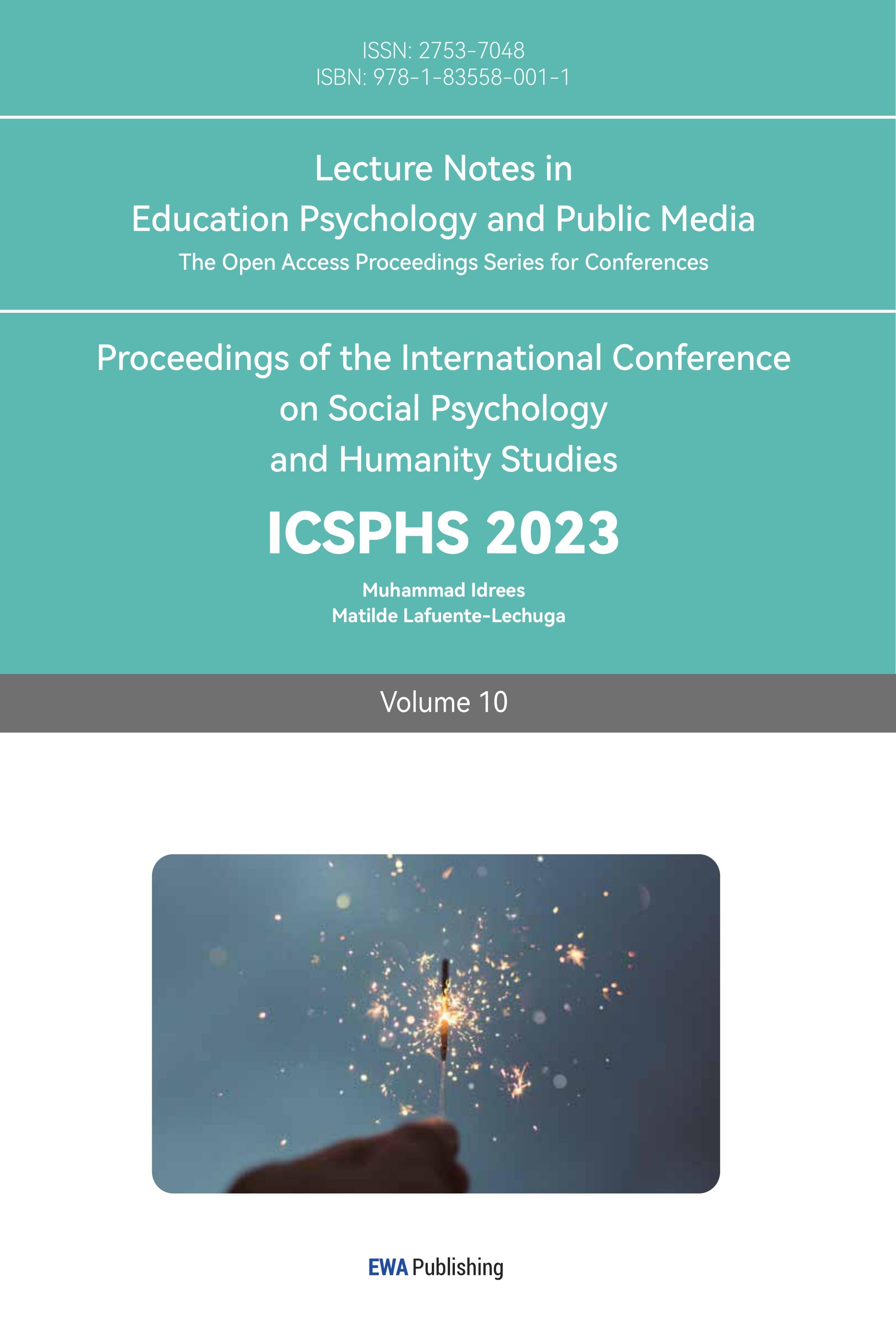References
[1]. Yang Jing. (2022). The role and significance of public policy value to policy process. FORTUNE TIMES(02),174-175.
[2]. Xun Shu. (2020). Policy Research Based on the Comprehensive Reform Pilot of Zhejiang and Shanghai College Entrance Examination (Master’s Thesis, Southeast University).
[3]. Wang Long. (2016). The Evolution of China’s College Entrance Examination System from the Perspective of Stakeholder Theory (Doctoral Dissertation, Nanjing Normal University).
[4]. Zhou Nan. (2015). A Study on China’s Long-distance College Entrance Examination from the Perspective of Public Policy Process Theory (Doctoral Dissertation, University of Science and Technology of China).
[5]. Li Tao & Wu Zhihui. (2013). Behind the Debate on the Public Policy of “long-distance College Entrance Examination” in China: A political Sociological analysis. China Youth Study(07),28-35.
[6]. Wang Houxiong. (2008). Research on Fairness of College Entrance Examination Policy in China (Doctoral Dissertation, Central China Normal University).
[7]. Pan Zhenyu & Tong Wensheng. (2022). Problems in the implementation of College Entrance Examination Policies in Different places and their solutions. Teaching and Management (30), 23-26.
[8]. Jiao Mengling. (2022). Research Review of the new College Entrance Examination Reform. Journal of Sichuan Vocational and Technical College (02), 46-51.
[9]. Lu Cixian, Sun Yanan & Zhi Xiaotong. (2022). Research on the influence mechanism of College Entrance Examination policy identification in Different places on the educational expectations of children with migrant families. Journal of Hebei normal university (education science edition) (01), 58-67.
[10]. Wang Jiaming. (2021). Research on New College Entrance Examination Policy Identity Based on Stakeholder perspective. Modern Education Administration (08), 9-17.
Cite this article
Ma,J. (2023). An Evaluation of the Chinese CollegeAdmission Examination System from the Standpoint of Equity in Public Policy. Lecture Notes in Education Psychology and Public Media,10,1-6.
Data availability
The datasets used and/or analyzed during the current study will be available from the authors upon reasonable request.
Disclaimer/Publisher's Note
The statements, opinions and data contained in all publications are solely those of the individual author(s) and contributor(s) and not of EWA Publishing and/or the editor(s). EWA Publishing and/or the editor(s) disclaim responsibility for any injury to people or property resulting from any ideas, methods, instructions or products referred to in the content.
About volume
Volume title: Proceedings of the International Conference on Social Psychology and Humanity Studies
© 2024 by the author(s). Licensee EWA Publishing, Oxford, UK. This article is an open access article distributed under the terms and
conditions of the Creative Commons Attribution (CC BY) license. Authors who
publish this series agree to the following terms:
1. Authors retain copyright and grant the series right of first publication with the work simultaneously licensed under a Creative Commons
Attribution License that allows others to share the work with an acknowledgment of the work's authorship and initial publication in this
series.
2. Authors are able to enter into separate, additional contractual arrangements for the non-exclusive distribution of the series's published
version of the work (e.g., post it to an institutional repository or publish it in a book), with an acknowledgment of its initial
publication in this series.
3. Authors are permitted and encouraged to post their work online (e.g., in institutional repositories or on their website) prior to and
during the submission process, as it can lead to productive exchanges, as well as earlier and greater citation of published work (See
Open access policy for details).
References
[1]. Yang Jing. (2022). The role and significance of public policy value to policy process. FORTUNE TIMES(02),174-175.
[2]. Xun Shu. (2020). Policy Research Based on the Comprehensive Reform Pilot of Zhejiang and Shanghai College Entrance Examination (Master’s Thesis, Southeast University).
[3]. Wang Long. (2016). The Evolution of China’s College Entrance Examination System from the Perspective of Stakeholder Theory (Doctoral Dissertation, Nanjing Normal University).
[4]. Zhou Nan. (2015). A Study on China’s Long-distance College Entrance Examination from the Perspective of Public Policy Process Theory (Doctoral Dissertation, University of Science and Technology of China).
[5]. Li Tao & Wu Zhihui. (2013). Behind the Debate on the Public Policy of “long-distance College Entrance Examination” in China: A political Sociological analysis. China Youth Study(07),28-35.
[6]. Wang Houxiong. (2008). Research on Fairness of College Entrance Examination Policy in China (Doctoral Dissertation, Central China Normal University).
[7]. Pan Zhenyu & Tong Wensheng. (2022). Problems in the implementation of College Entrance Examination Policies in Different places and their solutions. Teaching and Management (30), 23-26.
[8]. Jiao Mengling. (2022). Research Review of the new College Entrance Examination Reform. Journal of Sichuan Vocational and Technical College (02), 46-51.
[9]. Lu Cixian, Sun Yanan & Zhi Xiaotong. (2022). Research on the influence mechanism of College Entrance Examination policy identification in Different places on the educational expectations of children with migrant families. Journal of Hebei normal university (education science edition) (01), 58-67.
[10]. Wang Jiaming. (2021). Research on New College Entrance Examination Policy Identity Based on Stakeholder perspective. Modern Education Administration (08), 9-17.









